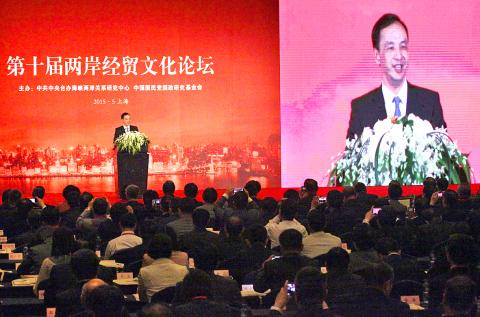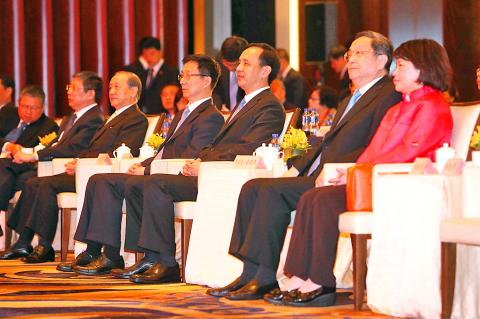New Taipei City Mayor and Chinese Nationalist Party (KMT) Chairman Eric Chu (朱立倫) yesterday expressed hope that Taiwan would develop a greater role in the global community based on the so-called “1992 consensus” between Taiwan and China.
Speaking at the 10th Cross-Strait Economic, Trade and Culture Forum in Shanghai, Chu said that he expects Taiwan to play a bigger role if the nation takes part in the China-initiated Asian Infrastructure Investment Bank (AIIB), Beijing’s “One Belt, One Road” trade initiative and the Regional Comprehensive Economic Partnership (RCEP) trade bloc.
Despite its smaller economy, land mass and population, Taiwan has strengths in innovation, management experience and research and development, allowing it to make substantial contributions to regional economic development through cooperation with China, Chu said.

Photo: AP
The “1992 consensus” refers to a supposed understanding between the KMT and the Chinese Communist Party (CCP) that both Taiwan and China acknowledge there is “one China,” with each side having its own interpretation of what that means. In 2006, former KMT legislator Su Chi (蘇起) admitted that he made up the term “1992 consensus” in 2000, when he was head of the Mainland Affairs Council, before the KMT handed power to the Democratic Progressive Party.
National Committee of the Chinese People’s Political Consultative Conference Chairman Yu Zhengsheng (俞正聲) said that Chu’s ideas could be discussed further at the annual KMT-CCP forum, as part of efforts to seek Taiwan’s participation in the AIIB, the “One Belt, One Road” initiative and the RCEP, and further possible approaches for cross-strait cooperation.
The discussions are aimed at increasing the competitiveness of “ethnic Chinese” and expanding their presence in the international market, Yu said.

Photo: CNA
Yu also said that the annual forum should stick to China’s stance regarding the “1992 consensus” and opposition to Taiwanese independence, which he described as a “mutual political foundation” for the development of cross-strait relations.
As China enters what has been called a “new normal” with lower economic growth, Beijing plans to help drive rational industrial positioning and introduce new measures for Taiwanese companies in China to address their problems with transformation and upgrading, Yu said.
China will also continue to protect the interests of the Taiwanese public, small and medium-size businesses, farmers and fishermen, allowing them to enjoy the benefits of enhanced cross-strait relations, he said.
Yu also urged the expansion of youth exchanges between Taiwan and China to encourage the wider involvement of young people in efforts to improve related policies.
Chu arrived in Shanghai on Saturday with a 100-member delegation to attend the annual KMT-CCP economic and cultural forum.
The highlight of Chu’s three-day visit is expected to be his first meeting with Chinese President and CCP General Secretary Xi Jinping (習近平). The meeting is to take place in Beijing today.
Chu yesterday avoided giving a direct answer to reporters’ questions about a peace pact between Taiwan and China.
Asked whether he would take advice provided by New Party Chairman Yok Mu-ming (郁慕明) and raise the issue of a cross-strait peace accord during a meeting with Xi, Chu said only that there are different opinions in Taiwan regarding the issue.
Some people prefer a more active pursuit of a peace pact and some are against it, but the KMT has its own objective and course of action, he said.
“We will hold our ground on what to do,” Chu said.

Seventy percent of middle and elementary schools now conduct English classes entirely in English, the Ministry of Education said, as it encourages schools nationwide to adopt this practice Minister of Education (MOE) Cheng Ying-yao (鄭英耀) is scheduled to present a report on the government’s bilingual education policy to the Legislative Yuan’s Education and Culture Committee today. The report would outline strategies aimed at expanding access to education, reducing regional disparities and improving talent cultivation. Implementation of bilingual education policies has varied across local governments, occasionally drawing public criticism. For example, some schools have required teachers of non-English subjects to pass English proficiency

‘FORM OF PROTEST’: The German Institute Taipei said it was ‘shocked’ to see Nazi symbolism used in connection with political aims as it condemned the incident Sung Chien-liang (宋建樑), who led efforts to recall Democratic Progressive Party (DPP) Legislator Lee Kun-cheng (李坤城), was released on bail of NT$80,000 yesterday amid an outcry over a Nazi armband he wore to questioning the night before. Sung arrived at the New Taipei City District Prosecutors’ Office for questioning in a recall petition forgery case on Tuesday night wearing a red armband bearing a swastika, carrying a copy of Adolf Hitler’s Mein Kampf and giving a Nazi salute. Sung left the building at 1:15am without the armband and apparently covering the book with a coat. This is a serious international scandal and Chinese

TRADE: The premier pledged safeguards on ‘Made in Taiwan’ labeling, anti-dumping measures and stricter export controls to strengthen its position in trade talks Products labeled “made in Taiwan” must be genuinely made in Taiwan, Premier Cho Jung-tai (卓榮泰) said yesterday, vowing to enforce strict safeguards against “origin laundering” and initiate anti-dumping investigations to prevent China dumping its products in Taiwan. Cho made the remarks in a discussion session with representatives from industries in Kaohsiung. In response to the US government’s recent announcement of “reciprocal” tariffs on its trading partners, President William Lai (賴清德) and Cho last week began a series of consultations with industry leaders nationwide to gather feedback and address concerns. Taiwanese and US officials held a videoconference on Friday evening to discuss the

PERSONAL DATA: The implicated KMT members allegedly compiled their petitions by copying names from party lists without the consent of the people concerned Judicial authorities searched six locations yesterday and questioned six people, including one elderly Chinese Nationalist Party (KMT) member and five KMT Youth League associates, about alleged signature forgery and fraud relating to their recall efforts against two Democratic Progressive Party (DPP) legislators. After launching a probe into alleged signature forgery and related fraud in the KMT’s recall effort, prosecutors received a number of complaints, including about one petition that had 1,748 signatures of voters whose family members said they had already passed away, and also voters who said they did not approve the use of their name, Taipei Deputy Chief Prosecutor